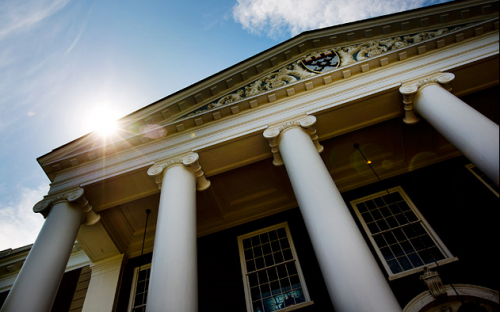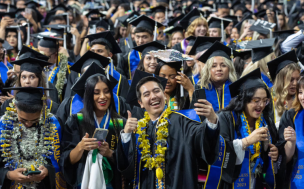His global ambition is common. A survey of 306 business schools by GMAC, which administers the GMAT entry exam, found internationals account for 71% of applicants to MBA programs in Europe; 58% to programs in the US.
Studying abroad will give you the international experience that employers crave, according to Amber Wigmore Álvarez, executive director of career services at Spain’s IE Business School, who studied for an MBA there.
“We can’t overlook the importance of cross-cultural communication skills, language being at the core, which lend to achieving cultural fit at multinational companies, which are continuously breaking free from physical geographies and defined markets,” she says.
Dan Bauer, a Harvard Business School MBA, and CEO of admissions consultancy The MBA Exchange, says a global alumni network has proved fruitful in any nation he’s worked in. “The international aspect has had a huge impact on my life.”
But how can international candidates break into b-school abroad? Below, four experts offer their advice.
Research And Apply
Jean-Philippe Odunlami, Harvard Business School MBA: “Take your profile from generic to unique”
JP, HBS class of 2007, says starting the application process about a year before you intend to begin an MBA is the ideal length of time. “A lot of applicants come in three/four months before, and that’s very short.”
When researching schools its key to keep your long-term career vision in mind at all times, says the former Goldman Sachs and JPMorgan Chase banker. “You’re looking for the right fit.”
The vast majority of applicants will go online to do their research. “Go beyond that,” says JP. Reach out to students, alumni, and admissions staff to stand out in a crowd. “Something very simple like emailing a student club can add tremendous value to your application,” JP says.
Social media sites such as LinkedIn are great tools here. But in-person meetings are king. “There are a number of information sessions held in different countries,” says JP.
The last component to consider is budget. Going to business school is expensive — and not just the tuition. JP says you’ll need to factor in funding for interviews: “You may have to fly to campus or go to a nearby city to interview with alumni.”
A Global Experience
Deepak Punwani, INSEAD MBA: “Diversity is the gift that keeps on giving”
Deepak likens studying abroad to going from black-and-white to colour television: “It gives you a different perspective.”
The 2005 INSEAD graduate, who is from India, says he cherished the diversity of his cohort. INSEAD makes sure your groupmates come from different backgrounds, says Deepak, whose group included MBAs from Portugal, Ireland and the US. The professors too at top business schools tend to come from different backgrounds, he says. “We had to....adjust to each other’s communication styles early on.”
That’s a gift that keeps on giving, adds the COO of Nuru Energy, a renewable energy start-up: “Years after your MBA program, you can enter any group from any background and do a good job.”
Studying abroad also has benefits outside of the classroom. “You learn significant amounts of life skills, such as [when] buying a car, a house, [or] opening a bank account. It’s those things that stand you in good stead, even after your MBA.”
Funding Your Future

Zach Hirshfeld, Prodigy Finance: “Cost can be a huge barrier”
MBAs are expensive. At Harvard, Stanford GSB and Wharton, annual tuition is more than $60,000. Factor in living and other expenses, and this runs to well over $100,000.
“Affording school can be a huge barrier to a lot of students,” says Zach, student relations manager for the US at Prodigy Finance, a tuition crowdfunding platform that works with top business schools.
He says this is particularly difficult for people in countries where salaries are lower than in the US or UK.
For those in Africa, Asia Pacific, Latin America and eastern Europe, financial aid is the top priority, according to a survey of 5,000 business school applicants last year by QS.
“It’s important to understand it will be a big financial leap studying abroad,” Zach says, adding that you should explore all funding options — including MBA scholarships and loans.
The pot of scholarship money has ballooned at business schools — it acts as a carrot to lure promising international talent. At MIT Sloan, 25% of students receive financial aid. At Yale SOM, the figure is one-third. At Stanford: 65%.

Getting In
Robert Clyne, Yale University: “You must wipe out the competition”
Robert is a big advocate of studying abroad: “You may have to migrate to go to the kind of school that will make your ambitions possible,” says the Yale PhD, who also studied at Stanford University.
But he knows there are challenges. “The biggest obstacle is writing an application that will wipe out 90% of your competitors,” he says.
Acceptance rates at elite business schools are low. At Stanford last year the MBA acceptance rate was 7%; 11% at Harvard; 13% at Berkeley-Haas.
“You have to understand what the admissions process is looking for,” says Robert. But “for people from abroad this can be challenging, and those who are not familiar with essay-driven applications will have some difficulty”.
RECAPTHA :
9b
1e
ee
bf










